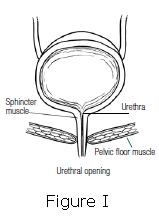Understanding the Causes of Stress Incontinence
The lower urinary tract is composed of the urinary bladder, the organ which stores urine and the urethra, the channel through which the urine exits the body. In between, you have a sphincter muscle. With stress incontinence or SUI, physical stress , exercise, coughing, sneezing, and other factors puts pressure on the top of the bladder. Sphincter muscles control the urethra like a valve. A weakened sphincter muscle is unable to keep the urethra closed and urine leaks out. SUI also results from weakness of the pelvic floor, the network of muscles that support the urethra and pelvic organs. (Figure I). Talk with J. Kyle Mathews, M.D. to determine whether you have experienced any of the following causes of stress incontinence.
Talk with J. Kyle Mathews, M.D. to determine whether you have experienced any of the following causes of stress incontinence:
Improperly Developed Tissue: : Intrinsic sphincter deficiency (ISD) leads to poor urethral function, even when the urethra is in a normal and well-supported position. With ISD, the walls of the urethra are not able to completely close, resulting in a slow-drip scenario or poor urethral sealing resulting in leaking with minimal activities. ISD may impact many cases of SUI and should be.
Previous Gynecological and Pelvic Surgery: In the past, women thought that SUI was rare and the result of nerve injuries, radiation to the pelvis or extensive pelvic surgery. Today we know that these can be factors, but there is a myriad of other causes. Hysterectomy or surgery to correct a prolapsed vagina or bladder can weaken bladder support and cause leakage from pressure. In addition, an episiotomy during childbirth, which involves cutting the tissue around the vulva to create more room for the baby during delivery, can weaken pelvic floor muscles. SUI may also affect men who have had surgical procedures for prostate disease and cancer.
Nerve Injuries to the Lower Back: The causes of stress incontinence often include young female athletes and participation in high-impact sports – such as gymnastics, track and field, running, cheerleading and basketball — that may weaken the supporting tissues or compress the lumbar spine in sever cases causing nerve inflammation. In these cases, it is best to begin treatment with Kegel exercises or manual therapy to address the main cause before trying a midurethral sling or MUS.
Pregnancy and Natural Childbirth: During pregnancy, the baby places extra weight on the bladder and increases the urge to urinate more frequently. Think of it as a weight adding pressure to a balloon. As the baby gains weight inside the uterus, it will increase the pressure and thereby increase the need to urinate. The muscles become stretched with each subsequent pregnancy and may eventually become too lax, causing the bladder to weigh heavily on the sphincter, which controls the release of urine.
Often, SUI will disappear when the baby is born. But after multiple pregnancies, a woman’s muscles may become overstretched and unable to bounce back. Pushing during delivery can also weaken and stretch the pelvic floor muscles. If the bladder or urethra shifts positions, SUI can result.
Menopause: Hormonal changes related to aging can affect tissue elasticity, including the bladder tissue. Unfortunately, hormone therapy or replacement estrogen may help it does not correct the problem. As the body ages, muscle loss and weakness can affect the urinary tract and result in SUI.
Medications, Illnesses and Other Factors: Many drugs may be included in the causes of stress incontinence. These include: diuretics, benzodiazepines, tranquilizers, antidepressants, hypnotics, anti-inflammatory agents, pain and blood pressure medications. Incontinence is also linked to poor overall general health, such as diabetes, stroke, high blood pressure, smoking, Parkinson’s disease, back problems, obesity, Alzheimer’s disease and pulmonary disease.
Urinary tract infections (UTI): -When microorganisms, usually bacteria from the digestive tract, cling to the opening of the urethra and begin to multiply, they can cause a UTI. In most cases, bacteria first begin growing in the urethra and often move to the bladder, causing a bladder infection (cystitis). If the infection is not treated promptly, bacteria may then go up the ureters to infect the kidneys (pyelonephritis).
If you live in the Dallas, Plano, Frisco or surrounding areas and experience stress incontinence, you can easily find out how the causes of stress incontinence may have affected your health by consulting a urogynecologist like Dr. J. Kyle Mathews. A urogyn has the advanced training to effectively diagnose and treat complex and commonplace problems that affect millions of women. Contact the Plano urogyn practice of Dr. J. Kyle Mathews at (972) 781-1444 for a consultation.












